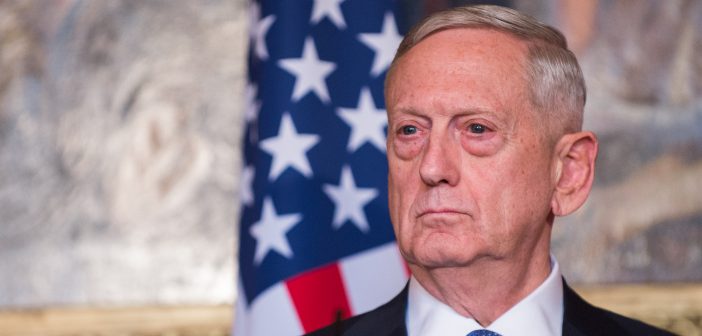Will a Trump Loyalist Continue to Reassure Allies and Prepare for China and Russia?
Now that Jim Mattis has resigned as America’s defense secretary, all eyes at home and abroad are on who President Trump will pick as a replacement.
Many are debating the qualifications of potential successors like Deputy Defense Secretary Pat Shanahan, Sen. Tom Cotton, R-Ark., former Rep. Jim Talent, R-Mo., Director of National Intelligence Dan Coats and others like Army Secretary Mark Esper.
Qualifications, however, will be secondary to personal loyalty when Trump makes a choice that will have major implications for national and international security for many years to come.
Furious that Mattis opposed or slow-rolled his priorities — and increasingly suspicious that those around him are serving institutions rather than his interests — Trump will demand a malleable new secretary who will ensure DoD executes his priorities.
Mattis — with Rex Tillerson and HR McMaster — consistently pushed back on Trump and was instrumental in reassuring nervous allies, working with admirable speed to refocus the nation and its allies on the rising great power competition between the United States and China and Russia.
Yet rather than laud his own team, Trump resented the principled men working for him, firing Tillerson and McMaster and ultimately forcing Mattis to resign. Mattis’ resignation letter enraged Trump because it rebuked his boss by stressing that America’s alliances and partnerships as well as multinational organizations like NATO are core to US security. He also underscored the need to be tough with authoritarian regimes like China and Russia that portray themselves as undemocratic models for other nations to emulate.
What sets America apart from other powers is its unprecedented network of alliances among like-minded nations.
Furious at the accolades Mattis received after his resignation, Trump ordered him out by Jan. 1, two months earlier than planned, to be replaced in an acting capacity by Shanahan until a new secretary is named. Trump likes to tap people in an acting capacity to allow them to audition for top jobs but demonstrating their loyalty and Shanahan has impressed the president by endorsing his priorities, like creating a Space Force.
What’s safe to say that Trump won’t pick someone like Mattis again, someone with the knowledge, experience and principles, grounded principles and character to push back against his bad ideas. Indeed, Trump time and again has demonstrated he’s not much interested in the creative tensions of thoughtful disagreement.
Adding to the disruption that Mattis’ departure will cause nationally and internationally is Trump’s decision to tap Gen. Mark Milley, the Army chief of staff, as Marine Gen. Joe Dunford’s replacement as chairman of the Joint Chiefs of Staff. Milley is a thoughtful leader, but by making the announcement nearly a year before Dunford’s term ends Trump has effectively gelded his highly capable chairman, another man who pushed back on major policy decisions. In the meantime, Milley remains Army chief without the authority to execute his vision as chairman. Dunford has said he will remain in office until the end of his term, but some expect him to step down sooner.
Ideally, the next secretary and their team can be Trump loyalists and quickly prepare the nation for a challenging future.
Leading strategists maintain America and its friends have only a few years to reorder spending, strategies, programs, doctrine and training to regain the initiative against nations that are increasing their military and other capabilities to systemically undermine the United States and its allies worldwide.
But the issue is that the president himself does not think long term or about shaping the instruments of power effectively towards a given future. Instead, he is a transactional, mercurial and unpredictable leader who reacts rather than apply a strategic vision. Moreover, instead of gathering like-minded allies with shared values, he displays a disturbing penchant for preferring authoritarians over democratic leaders.
Rather than seeing China and Russia as genuine national security threats that require sustained and coordinated efforts to counter, he views China as an economic threat and — for reasons that for now remain inexplicable — consistently strives to cooperate with, or help, Russia.
It’s appropriate that the president to harness America’s power to counter China’s nefarious economic practices and seek find ways to cooperate with potential adversaries.
But it’s vitally important that to see rising military adversaries for what they are, rather than purely as the potentially constructive partners he wishes them to be.
Here, his romance with Kim Jong Il is illustrative. Trump deserves credit for engaging in a dialogue with North Korea. But dialogue for its own sake that fails to address, or worse, ignores Pyongyang’s continuing nuclear and missile efforts is dangerous in the example it sets. Shower Trump with accolades and you to can get off the hook for misdeeds from missiles to murder.
So rather than challenge or check Trump on his questionable ideas, the new defense secretary may indulge him with potentially dangerous repercussions. China and Russia are already celebrating Mattis’ impending departure and are likely to take advantage of any gap afforded by Trump and his future defense team.
Some hope senior military officers can intercede. But while some nations groom their senior military leaders to serve as a check on the irrational or illegal behavior of their civilian masters, America’s general and flag officers have no such culture. If given a legal order, they will execute it, whether abandoning Syria, withdrawing from Iraq or dialing back in Afghanistan. The notion that America’s senior military officers will somehow act as a brake of last resort on an unruly presidency is both naive and absurd.
What the nation’s military leaders can do is reassure allies and continue to drive forward efforts to prepare for the future as thoughtfully as possible given the breadth of uniformed and civilian talent that — for the time being — remains at the Pentagon.
The problem is that time is not on our side. In its last two years in office, the Obama administration started fruitful efforts to counter China and Russia, laying the groundwork for the “great power” strategy that Mattis, McMaster and others have advanced.
We can’t afford to have those efforts stall in the last two years of Trump’s term — a challenge for even the best run administration.
This isn’t a question of merely spending, but the fundamental choices that are made and the rhetoric and policies set by the president. At this point, an unbridled America First approach that further undermines the international order and alliances that have maintained global stability since World War II are growing increasingly fragile could prove devastating.
Indeed, the damage to date, and the prospect of worse to come may prove irreparable even if a more traditional, internationalist president is elected in 2020.
At best, a new president backed by the most qualified secretaries of state and defense likely will have to spend years rebuilding damaged links.
The bigger worry is that facing internal divisions of their own, long-time allies may prove unable to realign themselves to a more traditional future American president, thereby undermining critically important alliances that are, after all, associations of nations bound by common values, norms and the rule of law.
Over the course of four roller coaster Trump years they may realign to the point they may be far less interested in reviving what we had. That’s especially the case given each America’s most important European allies — all core to US security — face powerful internal forces as eager to disengage from international organizations as Trump is. Mostly right-wing, nationalist movements in Britain, France, Germany, Hungary, Italy, Poland, the Netherlands and even Scandinavia disdain for institutions founded on universal values of equality, democracy and human rights.
Rekindling jilted alliances is akin to rebuilding broken relationships — you may want your old partner back, but that partner may not share that sentiment. Nations, like people, adjust to new circumstances and once they do, it’s hard to get return to what used to be normal.
Congress can be a check, but it remains to be seen how effectively.
There have been welcome shows of bipartisan support for allies, democracy, rule of law and the value of a free press, but these groups of lawmakers have been small and composed of members who regularly espouse these traditional views. The reality is, you need both houses to see the problem clearly and act appropriately as a check on the administration — whether in confirming a potentially un- or under-qualified defense secretary or holding them to account after they take office.
A Democratic House may act to check Trump’s power come January, but it’s unclear whether a GOP Senate will follow suit. A new crop of Democratic leaders may be equally eager to disengage from the world to free resources for the social causes that got them elected, like providing better healthcare and social benefits for their constituents.
The problem we face is bigger than Trump or his enablers. The generation that experienced the horrors of World War II are dying off at a rate of more than 1,200 a day. The generations that have benefitted from the world they created that fostered the security and economic, diplomatic and cultural cooperation to avoid another world war took that order for granted.
The generations that came after them, today’s youth, have little understanding or appreciation of, or for, this virtuous order. If we’re lucky, they studied history. More likely, they didn’t and are ignorant of the track that we’re on, not realizing that it will be their children who will pay the price after these institutions, weakened, begin to fail.




